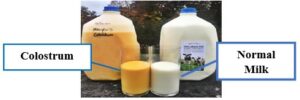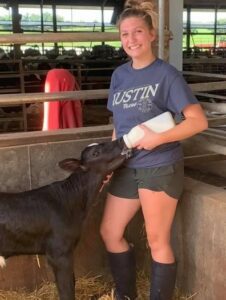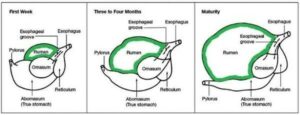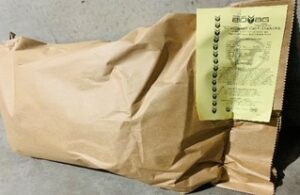Understanding the Importance of Colostrum

Calves have openings in the small intestines to accommodate protein absorption, but these openings close shortly after birth. Absorption is minimal beyond 12 hours of age, so the best time to feed the calf colostrum is within the first four hours of birth. A rule of thumb is calves should consume 10 to 12% of their body weight of colostrum. For example, a 90lb calf should be fed 4 quarts of colostrum.
Nutrients in Colostrum
The immunoglobulins found in colostrum are large proteins. There are three types of immunoglobulins (Ig) that can be found in colostrum.
- Immunoglobulin G (IgG) makes up 70% to 80% of the immunoglobulins and helps to identify and destroy invading pathogens.
- Immunoglobulin M (IgM) comprises 10% to 15% of immunoglobulins and serves as the first line of defense against septicemia.
- Immunoglobulin A (IgA) comprises the remaining 15% of immunoglobulins in colostrum and protects the mucosal surfaces, such as the intestine, from invasive pathogenic bacteria.
Colostrum also contains vitamins, minerals, energy (carbohydrates, fat) and proteins needed for calf metabolism, growth and for additional stimulation of the calf’s immune system. Hormones (insulin) and growth factors (IGF-1) in colostrum also aid metabolism for the calf.
Rumen Development
Ruminants have four stomachs, the rumen, reticulum, omasum, and abomasum. When the calf is born the rumen and reticulum make up 30% of the stomach, yet remain underdeveloped, sterile and nonfunctional. The abomasum, or true stomach, represents 60% and omasum represents 10%.
Within the first day of birth, large concentrations of bacteria (mostly aerobic) start to populate the rumen. Within two or three days of age, start to introduce a dry feed, such as calf starter. Feeding calf starter will stimulate the numbers and species of bacteria in the rumen. Also, the intake of a highly-digestible calf starter stimulates the development of rumen papillae, the fingerlike projections that absorb nutrients. Rumen bacteria need water to ferment dry calf starter feeds and later forages, so always have clean water available to the calf at all times.
Determining When to Wean a Calf
Weaning should be determined by the rumen development, not the age of the calf. When a calf is consuming 2 lbs or more of calf starter for at least 3 consecutive days, then weaning can start, for that indicates adequate rumen maturity. Normally, healthy calves when they are 21 days old should be capable of consuming 2 lbs of calf starter. Many calves are consuming 4-6 lbs of starter at 35 days of age. If a calf is not consuming 2 lbs of calf starter by 35 days of age, either inadequate fluid has been available, poor quality calf starter or a health issue exists.
Poor calf starter intake is the leading cause of malabsorption diarrhea. Since weaning creates stress for the calf, delays weaning for sick animals or if a disease outbreak occurs. However, still use rumen development as a guide to weaning and not the ages listed above.
Once weaned, keep calves in individual housing for approximately 7 to 14 days to observe calf health and feed intake. Calves may be moved to group housing at seven to eight weeks of age or one to two weeks after weaning. Following this calf program is a great way to have your calves grow into strong, healthy, and high-producing cows.
 Product of the Week: “O” BioBaby Calf Starter
Product of the Week: “O” BioBaby Calf Starter
The “O” BioBaby Calf Starter is a complete calf starter composed of grains, quality minerals and vitamins.
-
-
-
-
-
-
-
-
- The grains are certified organic and are roasted to improve digestibility.
- It contains minerals to meet your calf requirements, including sulfate forms of trace minerals.
- It meets daily vitamin needs, including vitamins A, D3, E and B complex and contains kelp as a source of over 60 trace minerals and vitamins.
- “O” BioBaby helps promote reproductive health, immune system function, and hoof health. Contains viable, naturally occurring microbial and digestive enzymes. Just what calves need to get their rumen developing.
-
-
-
-
-
-
-
LOOKING FOR SUPPORT WITH LIVESTOCK NUTRITION? CONNECT WITH ONE OF OUR CONSULTANTS




